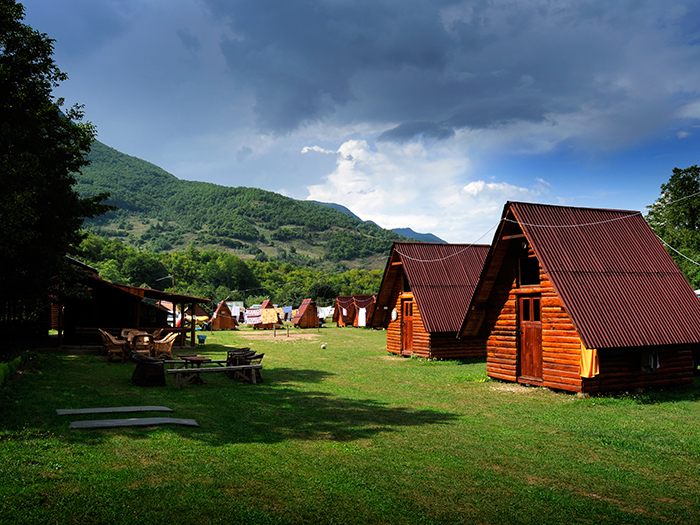Sponsored: Philadelphia Insurance Companies
3 Risks Every Camp Operator Needs to Address Today to Make Camp Safe and Fun

Late-night stories around a campfire, arts and crafts, swimming lessons, hiking and more. Camp is every child’s dream getaway, especially now that many sites offer boating lessons, climbing walls, go-karting and more all season long.
“Camps are always trying to find new, exciting ways to keep old campers and attract new campers every season,” explained Colin Liberatore, lead underwriter for camp product at Philadelphia Insurance Companies (PHLY).
The camp business is an $18-billion industry, according to American Camp Association data. Every year, 14,000 camps across the U.S. gear up for the nearly 14 million campers excited to attend. And whether its an overnight stay or a day camp, these sites are continuing to add activities to make each summer the best ever for their campers.
But with each activity comes its own set of risks.
Camps are home to children as young as seven years old to those in their late teens.
“Camp operators need to be aware of all the risks and recommendations for preventing potential claims, especially when it comes to the demographic of campers under their protection,” said Rob Wilder, underwriting product manager, PHLY.
Here are three of the most prevalent risks facing camps and what the operators of the camps can do to manage them.
1) In order to remain competitive, camp operators across the U.S. are adding high-hazard activities

Colin Liberatore, Lead Underwriter for Camp Product at Philadelphia Insurance Companies
Boating lessons, climbing walls and go-karting are just the start; camps are adding more and more high-hazard activities to their repertoire in an effort to remain competitive with the thousands of other camps across the U.S.
“There’s more customization going on at campsites. Each camp wants to stand out by offering their campers the activities they want to do,” said Liberatore. “It’s no longer the days of four or five activities that everyone participates in; campers can choose between 40 and 50 activities across one summer.”
These new activities include ziplines, water trampolines, rope courses, mountain biking, skateboard parks and more. Wilder added they’ve even seen yoga lessons done on horseback.
In addition, campsites are starting to offer STEM activities — like drone flying or chemistry laboratories.
“These are the types of activities that appeal to the young generation,” explained Liberatore.
“And while STEM activities seem innocuous because they are educational in nature, they can still be dangerous,” he added.
Accidents and injuries are some of the top concerns with each new activity.
On the insurance side, “we’re looking to see that operators have the proper controls in place,” said Wilder.
With regards to adventure courses, including high ropes courses, climbing walls, etc., Wilder and Liberatore both said it is imperative for camp operators to ensure proper installation by an Association for Challenge Course Technology or similar reputable organization certified independent consultant They should also require staff to be trained and certified by those organizations. By doing so, the camp can be assured their equipment meets industry standards, their staff understands how to utilize and maintain the equipment and, most importantly, that it is safe for campers to use.
For items like boats, ATVs, jet skis and the like, they recommend regular inspections and that only counselors be allowed to operate.
Written guidelines, protocols, safety warnings on equipment and proper training of staff and campers is also a good way to prevent injury and misuse of equipment.
2) Wildfire and brushfires are becoming more prevalent, both on a small and a large scale.

Rob Wilder, Underwriting Product Manager at Philadelphia Insurance Companies
Campsites are ripe with the opportunity for fire. Many camp activities include the use of a flame as well, from the simple task of grilling hot dogs to the use of Fourth of July fireworks.
“More often than not, these sites are surrounded by a significant amount of trees and brush,” said Liberatore.
Location is a huge factor when it comes to managing fire. Camps in California, Colorado, Texas, Arizona and other states also have to contend with wildfire season. Additionally, campers often sleep in wood-framed buildings in remote areas, with volunteer fire departments located miles away, which may cause a delay in response time.
“The camp may not have a sprinkler system or they may not have a great water source,” added Wilder. They recommend having an adequate water source to fight fires. Investing in evacuation plans and procedures can also protect lives in the case of incident, especially if a volunteer fire department is not in close proximity to the camp. Making sure embers are doused at night and conducting regular pruning maintenance on both trees and brush is an annual activity that can reduce the spread of fire.
Fire risk, therefore, is one that both Wilder and Liberatore said camps need to be proactive in addressing.
3) Abuse reporting has found a voice after the #MeToo movement, and camps are no exception.
What started as a reckoning in Hollywood has become a national movement to stop abuse from taking place across the country, and #MeToo has given victims of abuse a platform to speak up.
“The movement has enabled people to come forward, not just at camps, but in many industries,” said Liberatore. “Older abuse claims from 10, 15, even 50 years ago, are starting to come to light.”
The relationship between counselor and camper can, unfortunately, become blurred in some instances and lead to these types of abuse claims.
Social media, messaging and texting enable communication long after the camps closes for the season.
“If a counselor or staff member gets a social media account from a camper and they continue to interact with them on Twitter or Instagram or Snapchat, after the camp season ends, they’re continuing the relationship out of the eyes of the supervision of the camp. But it still has the ability to lead back to the camp,” said Liberatore.
Camps can take a proactive role in deterring such behavior. Training to prevent grooming, social media guidelines, and conducting background checks on all counselors and staff members is just the start.
Wilder added that camps need to set up requirements and training for immediate reporting of any actual, alleged or suspected abuse.
“Camps must prevent the opportunity for one-on-one unsupervised contact,” he said. Make sure to partner with an agency that helps ensure there are formal written abuse prevention guidelines and best practices in place, Wilder added.
“A zero-tolerance policy, at the end of the day, is what we want to see,” said Liberatore.
Protecting the Life-Long Lessons That Summer Camps Teach
Summer camp is more than a getaway; camp teaches powerful lessons in community, character-building, skill development and healthy living to young campers every year.
At PHLY, the risk management team is eager to provide the inspection services and training sessions their clients need.
“From abuse training services, helping to review contracts and making sure that camps are properly cleared and maintained, PHLY offers assistance,” said Wilder.
In addition, PHLY has partnered with an active shooter training program and has its own distracted driver training platform for customers who transport their campers.
PHLYTrac is another risk management tool which involves a GPS device placed inside each vehicle that delivers real-time monitoring and safety practices of the driver.
“We have a variety of resources and risk control offerings that anyone who comes on board with PHLY has access to,” said Liberatore.
While these are three of the most common risks, there are many other unique and challenging exposures that camp operators face. Proper risk management all year round is essential to ensure a safe and fun time for campers.
To learn more, visit: https://www.phly.com/Products/CampOperators.aspx.
This article was produced by the R&I Brand Studio, a unit of the advertising department of Risk & Insurance, in collaboration with Philadelphia Insurance Companies. The editorial staff of Risk & Insurance had no role in its preparation.










